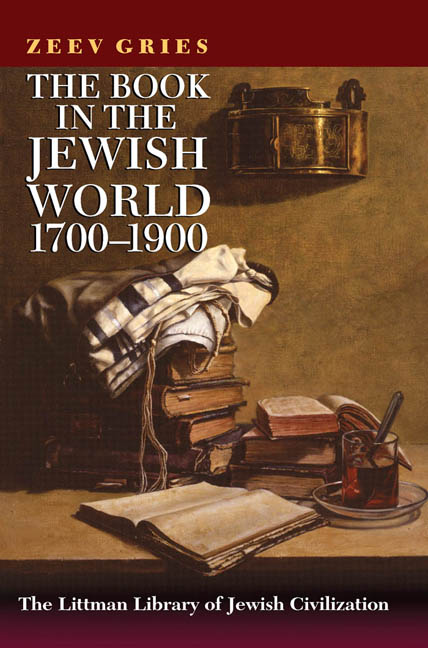Book contents
- Frontmatter
- Dedication
- Preface to the English Edition
- Contents
- List of Illustrations
- Note on Bibliographical Conventions and Transliteration
- Introduction
- PART I THE AWAKENING OF THE NASCENT INTELLIGENTSIA
- PART II THE BOOK: GUARDIAN OF THE SACRED OR HERALD OF SECULARIZATION?
- 8 The New Hebrew Literature: Continuity or Revolution?
- 9 Jewish Books and their Authors in the Nineteenth Century
- 10 Book Reviews in the Hebrew Press
- 11 The Bibliographer and Librarian as an Agent of Culture: The Contribution of Abraham Ya'ari to the Study of Jewish Publishing in Eastern Europe
- Afterword: The Revolution in the World of Hebrew Books at the Start of the Twentieth Century
- Appendix: The Young Abraham Ya'ari
- Bibliography
- Index of Books and Periodicals
- Index of Places
- Index of People
- Index of Subjects
9 - Jewish Books and their Authors in the Nineteenth Century
from PART II - THE BOOK: GUARDIAN OF THE SACRED OR HERALD OF SECULARIZATION?
- Frontmatter
- Dedication
- Preface to the English Edition
- Contents
- List of Illustrations
- Note on Bibliographical Conventions and Transliteration
- Introduction
- PART I THE AWAKENING OF THE NASCENT INTELLIGENTSIA
- PART II THE BOOK: GUARDIAN OF THE SACRED OR HERALD OF SECULARIZATION?
- 8 The New Hebrew Literature: Continuity or Revolution?
- 9 Jewish Books and their Authors in the Nineteenth Century
- 10 Book Reviews in the Hebrew Press
- 11 The Bibliographer and Librarian as an Agent of Culture: The Contribution of Abraham Ya'ari to the Study of Jewish Publishing in Eastern Europe
- Afterword: The Revolution in the World of Hebrew Books at the Start of the Twentieth Century
- Appendix: The Young Abraham Ya'ari
- Bibliography
- Index of Books and Periodicals
- Index of Places
- Index of People
- Index of Subjects
Summary
THERE IS FIRM EVIDENCE that until the end of the nineteenth century, the prime factor encouraging intellectual activity in the great Jewish cities of eastern Europe was religious literature.Although today it is not fashionable to consider how this literature of rabbinic responsa, epistles, commentaries on the Talmud, homiletics, and exegesis served the lives of the Jews in a changing world, there is no doubt that it was intended to offer solutions in times of distress and to fulfil yearnings for spirituality and closeness to God.
It is interesting to compare the output of two major centres of Jewish publishing in the nineteenth century, Lemberg and Vilna. Lemberg in the 1860s accommodated the hasidim, the maskilim, and the traditional halakhic authorities without excessive friction. Vilna, in contrast, was home to an impressive array of both traditional scholars and maskilim and had supposedly been the centre of opposition to hasidism in earlier generations.We find testimony to this in the memoirs of the literary critic Abraham Jacob Papirna,who recounts that, when he was a student at the Vilna yeshiva, an itinerant rabbi called Tsevi Hermann Schapira (who ultimately became a professor of mathematics in Heidelberg, and later conceived the idea of a Jewish National Fund for the purchase of land in Palestine for the Jewish people) read excerpts from his anti-hasidic satirical writings there. One of these satires, which Schapira called both Masekhet ḥasidim (Tractate of the Hasidim) andMasekhet shirayim (Tractate of the Tsadik's Leftovers), was eventually published with a commentary by Isaiah Tishby.
Another literary critic in Vilna at this time was Abraham Uri Kovner, who recounts how he found, read, and enjoyed the manuscript of Boḥen tsadik (The Examiner of the Holy Man).The author was not named, but Kovner assumed that it was Joseph Perl, the author of Megaleh temirin (The Revealer of Hidden Things), printed in Prague in 1838. Both books were critiques of the hagiographies of the tsadikim that were then popular. Maskilim, who served as tutors in the homes of wealthy Jews, liked to read these satires; since they were hard to obtain they copied them by hand in their free time, as I heard from Shmuel Werses, who drew my attention in this context to a note by his teacher Professor Klausner on Divrei tsadikim (The Words of the Tsadikim) by Isaac Ber Levinsohn.
- Type
- Chapter
- Information
- The Book in the Jewish World, 1700–1900 , pp. 113 - 137Publisher: Liverpool University PressPrint publication year: 2007

